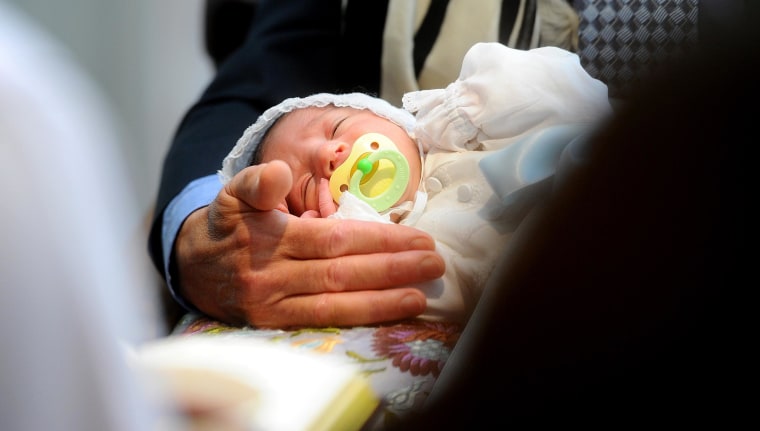Nearly a quarter of newborn boys are not being circumcised, according to a new report. It's a trend that the researchers say could lead to medical complications for half of those boys over their lifetimes.
The rate of neonatal circumcision in the United States fell to just 77 percent in 2010 from a high of 83 percent in the 1960s, according to the report published Wednesday in the Mayo Clinic Proceedings.
The international team of researchers say that's worrisome because uncircumcised infants are at a greater risk for urinary tract infections, which can lead to kidney damage. Indeed, they cite research showing that intact foreskins lead to adverse medical conditions in half of uncircumcised men.
A review of the scientific literature found the health benefits of circumcision exceeded the risks by more than 100 to 1, said Brian J. Morris, lead author of the study and a professor emeritus of the School of Medical Sciences and Bosch Institute at the University of Sydney.
The most common medical problems associated with an intact foreskin are bacterial and viral infections, including urinary tract infections and sexually transmitted diseases, Morris said.
There are other very serious medical conditions connected with the foreskin, including penile cancer, which has high mortality and is "extremely rare in circumcised men," Morris said. Prostate cancer rates may be 15 to 20 percent higher for uncircumcised men, he said, according to recent studies.
Some parents have opposed what they call an inhumane practice, but much of the drop in circumcision in the U.S. may be due to the influx of immigrants who culturally are opposed to circumcision. "The burgeoning Hispanic population in the West accounts for most of the decrease in national prevalence," the researchers reported.
Doctors and parents should look at circumcision in the same way they look at vaccinations, Morris said. Parents might be hesitant to get their newborn sons circumcised, but they should recognize it as surgery that will improve health.
Dr. Michael Carr hopes that the new report will help educate parents — and politicians.
"There are 18 states for which it is currently not covered by Medicaid," said Carr, associate director of pediatric urology at the Children's Hospital of Philadelphia and an associate professor of urology at the Perelman School of Medicine at the University of Pennsylvania. "African Americans and Hispanics already have a lower rate of circumcision and having to pay out of pocket may make it even more likely that it won't be done."
The new report may prompt doctors to advocate more for circumcision with parents.
"If parents don't want to vaccinate we ask why. And then we explain why it's beneficial," said Dr. John M. Fisch, director of Womancare at Magee-Womens Hospital. "Doctors haven't done that with circumcision. They've basically left it up to parents. This report suggests we need to educate more, especially among those groups who may not understand why it's beneficial."
